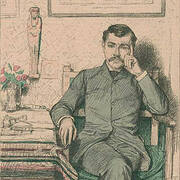Paul Bourget (1852–1935)
Author of The Disciple
About the Author
Image credit: From "Revue illustrée", 1887
Courtesy of the NYPL Digital Gallery
(image use requires permission from the New York Public Library)
Courtesy of the NYPL Digital Gallery
(image use requires permission from the New York Public Library)
Works by Paul Bourget
The Land of Promise 3 copies
Coeur pensif ne sait où il va 3 copies
La rechute 3 copies
Physiologie de l'amour moderne 3 copies
Nos actes nous suivent tome II 2 copies
L'envers du décor 2 copies
Le disciple, extraits 2 copies
Pastels et eaux-fortes 2 copies
Nos actes nous suivent 2 copies
Un drama en el gran mundo 2 copies
A Saint 2 copies
Conflits intimes 2 copies
LE DEMON DE MIDI, TOME 1 2 copies
Anomalies 1 copy
Le Disciple. Extraits. Avec Une Notice Biographique, Une Notice Historique Et Littéraire, Des Notes… (1967) 1 copy
El discípulo 1 copy
Luxe des autres, Le 1 copy
La dame qui a perdu son peintre. suivi de la seconde mort de broggi-mezzastris et une nuit de noël sous la… (1934) 1 copy
Cosmopolis, Volume 1 1 copy
L'étape 1 copy
HI Inostri atti ci seguono 1 copy
Antigone 1 copy
Kosmopolis (German Edition) 1 copy
Sociologie et littérature 1 copy
Nemesi 1 copy
Bourget Paul 1 copy
Études et portraits 1 copy
Les detours du coeur 1 copy
Ett felsteg 1 copy
Julm mõistatus : [romaan] 1 copy
Izabrana djela 1 copy
Deuxième amour 1 copy
La Terre Promise. tome 2 1 copy
Un corazón de mujer 1 copy
La cárcel 1 copy
Recommencements 1 copy
Kinderherzen 1 copy
On ne voit pas les coeurs : Le soupc_on ; La ve_rite_ de_livre ; Trop de reme_des est un poison 1 copy
L'envers du décor : Le mensonge du père ; Les Moreau-Janville ; Tragédies secrètes ; Le déserteur 1 copy
Armastuse kuritegu 1 copy
Études anglaises 1 copy
Paul Bourget : Monique 1 copy
Un divorce (tome1) 1 copy
Associated Works
Tagged
Common Knowledge
- Legal name
- Bourget, Paul Charles Joseph
- Other names
- BOURGET, Paul Charles Joseph
BOURGET, Paul - Birthdate
- 1852-09-02
- Date of death
- 1935-12-25
- Burial location
- Cimetière du Montparnasse, Paris, Île-de-France, France
- Gender
- male
- Nationality
- France
- Birthplace
- Amiens, France
- Place of death
- Paris, France
- Places of residence
- Clermont-Ferrand, Auvergne, France
Paris, France - Education
- Lycée Louis-le-Grand
École des Hautes Études - Occupations
- novelist
critic - Relationships
- James, Henry (friend)
- Organizations
- Académie française (1894)
- Awards and honors
- Légion d'Honneur (Officier )
Members
Reviews
Lists
Awards
You May Also Like
Associated Authors
Statistics
- Works
- 116
- Also by
- 3
- Members
- 399
- Popularity
- #60,805
- Rating
- 3.7
- Reviews
- 4
- ISBNs
- 78
- Languages
- 6
- Favorited
- 1
















Balzac and Zola had nothing to worry about long term, but Chatterton-Hill didn't know that. He had the bad timing to publish his article a few months before World War 1 began, which reminded everyone of the timeless benefits of pessimism and nihilism. Balzac and Zola were probably better writers than Chatterton-Hill's optimistic French grouping of course, but nevermind, it was interesting to take a look at a past century's literary dead end.
Chatterton-Hill dated the initial birth of this "turning" of French literature to Bourget's publication of Le Disciple in 1889, which would come to fruition a couple decades later. The Disciple is a philosophical novel that takes aim at positivism and scientific determinism. Sounds fun, no? It was actually a bestseller in France at the time. The set up is that we have an older philosopher, Adrien Sixte, who is well known for his writings arguing that mankind is a mere thinking machine, whose behaviors are absolutely determined by scientific laws, living in an amoral and godless world where society labels some behaviors virtues and others vices with no real merit to such labeling. With enough experimentation and information, the scientific laws determining how people behave could be discovered, with the same predictability and repeatability that one finds in a chemistry lab.
His writings influence a young scholar, Robert Greslou, who visits Sixte. Later Greslou is arrested for the murder of a young woman in a family he works for as a tutor, and he writes a lengthy "confession" to Sixte in which his application of Sixte's ideas to an experiment on human feelings and behavior are revealed to have terrible effects. This confession is a good deal more of telling than showing, thus it is hardly great literature, but it's not bad either, and it does have its philosophical interest. It also has aspects of an unfolding mystery, though Bourget would surely have found that sort of interest as a poor thing to take away from his novel.… (more)